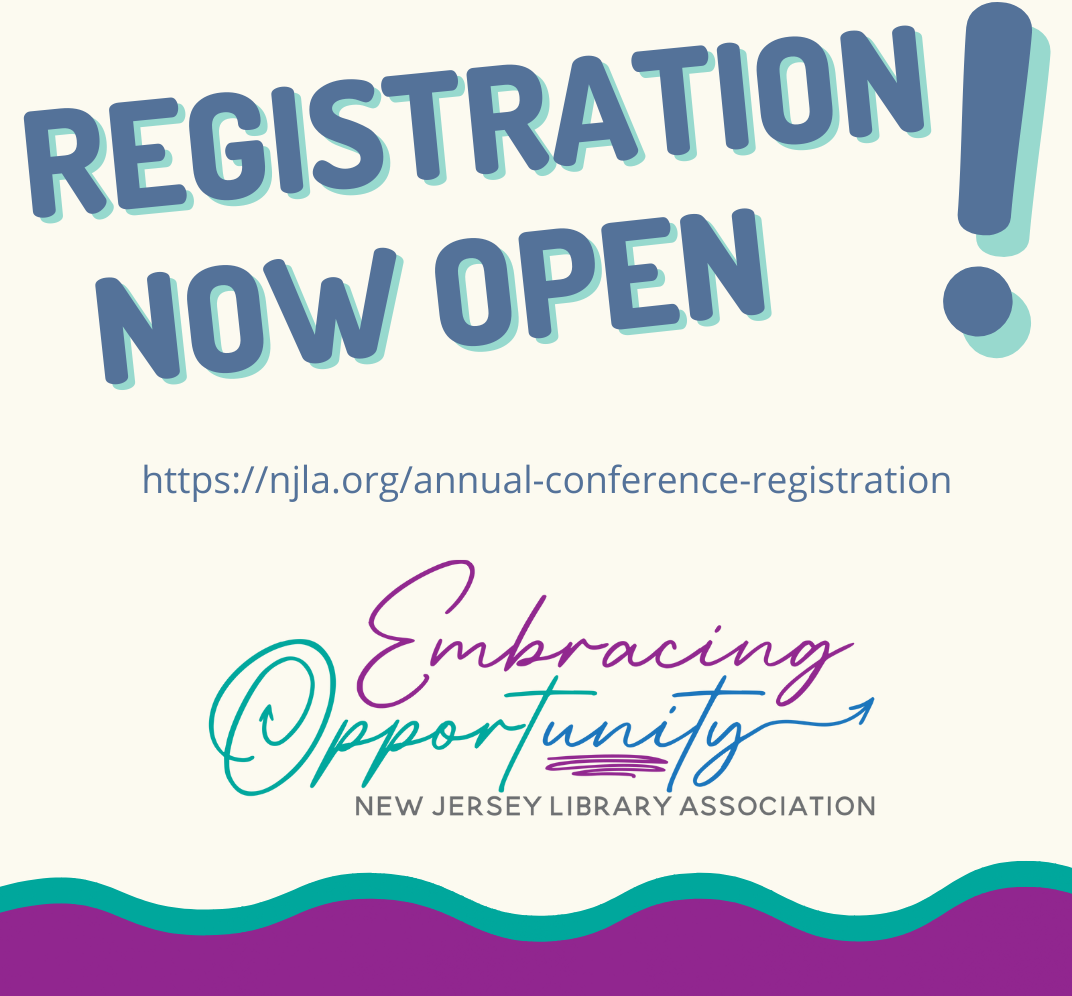Spring 2022 CUS/ACRL-NJ Newsletter

In This Issue...
- Announcements
- VALE Updates
- 2022 NJLA Conference
- News from John Cotton Dana Library - Rutgers University - Newark
- New Teaching Resource: “Information Literacy Through Entrepreneurial Thinking: Activities for Teaching Across the Disciplines”
- Generation Z: Providing Services to the “Instant” Generation in Higher Education
- Saint Peter's University Library Celebrates March Madness
- LibraryLinkNJ Spring & Summer Events
- Usability Testing in a Pandemic: A Tale of Two Approaches
- News from SCARLA
- From Antarctica to Outer Space - My Summer Research Internship at the Law Library of Congress
- Rider University’s Moore Library Selected For Competitive Federal Humanities Grant
- The Year of Tiger at Union County College
- TikTok: Time to Meet Stockton Students Where They Are
VALE Updates
By Melissa Lena, VALE Program Manager
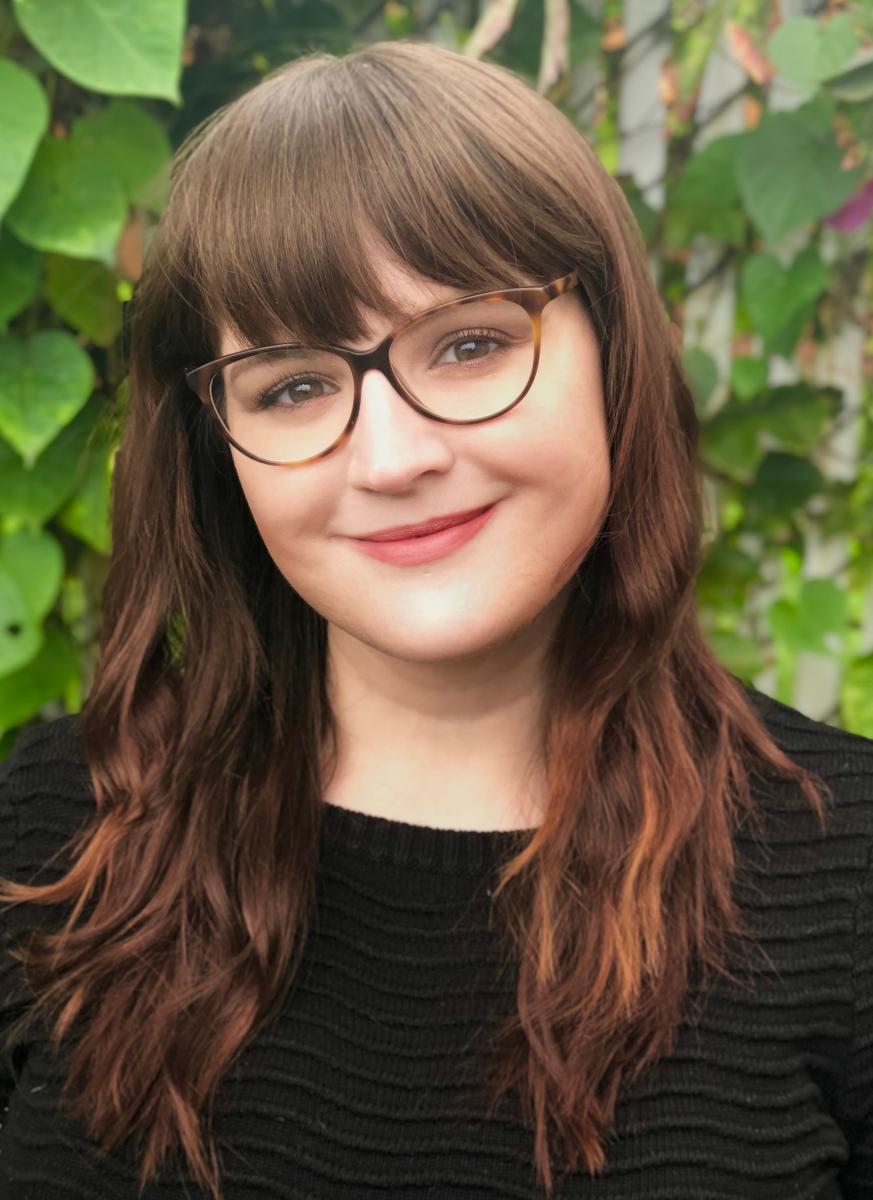
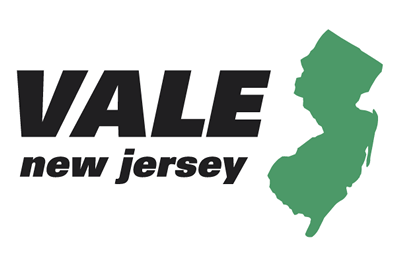
VALE has been known as your go-to source for databases, but did you know that we’ve expanded our catalog to include other e-resources and applications for your library?
In 2019, VALE partnered with Springshare to offer the entire Springshare LibApps Suite, including: LibGuides, LibAnswers, LibCal, LibInsight, LibStaffer, LibWizard, and LibCRM. This has been a popular offering with VALE members as a service-oriented platform customized to meet the needs of your library.
Streaming media also became an option through VALE in 2019 and 2020 with the addition of ProQuest’s Academic Video Online, Infobase’s Films On Demand, SAGE Video, and Digital Theatre+ . In surveys to the membership we’ve found that students and faculty are increasingly requesting streaming video, and that streaming media has been an expanding item in library budgets. In 2022, Kanopy announced that they were developing a new streaming video subscription model, and we are looking to make that a VALE offering as soon as possible.
In 2021, VALE partnered with Our Research to offer Unsub - a data dashboard and forecasting tool that helps academic libraries reevaluate the value of “big deal” packages and understand cancellation options.
In 2022, VALE will offer the usage statistics tool CELUS. The tool integrates with ConsortiaManager and supports COUNTER 4, COUNTER 5 and custom non-COUNTER data. CELUS allows librarians to view usage data for all of their library’s e-resources with the ability to get as granular as needed.
In addition to the consortial discounts that VALE is able to offer its members, there are other benefits of buying through VALE rather than directly with a vendor. Each VALE product undergoes a thorough license review process with librarians and legal counsel to achieve the best terms and conditions for NJ's academic libraries, including ADA/Section 508 accessibility compliance. VALE uses ConsortiaManager, which allows librarians to: see price trends; find information about your licenses, FTE, terms, content files and contact details; make your own IP-address changes which notifies the publishers for you; and easily access licenses, usage data, title lists, prices and invoices. Purchasing through VALE also simplifies your billing process, it saves time by paying one invoice for multiple e-resources.
We are currently finalizing pricing with our vendors for the 2022-2023 academic year, and will publish renewal and new product pricing to your ConsortiaManager account in early May. If there are any products that you would like to see as a VALE offering, please contact us anytime.
2022 NJLA Conference
Register for the 2022 NJLA Conference!
News from John Cotton Dana Library - Rutgers University - Newark
 The John Cotton Dana Library, Rutgers University-Newark is pleased to announce that Dr. Sean Lorre (Ph.D., Musicology, McGill University; M.A., Jazz History and Research, Rutgers-Newark) has been appointed as the new managing editor of the Journal of Jazz Studies effective March 7, 2022.
The John Cotton Dana Library, Rutgers University-Newark is pleased to announce that Dr. Sean Lorre (Ph.D., Musicology, McGill University; M.A., Jazz History and Research, Rutgers-Newark) has been appointed as the new managing editor of the Journal of Jazz Studies effective March 7, 2022.
Dr. Lorre teaches graduate seminars and online courses on popular music and jazz history at Rutgers University-Newark and for Mason Gross’s Arts Online division. His research takes an interdisciplinary perspective on issues of genre formation, representation, and the racial and gender politics of transatlantic jazz and popular music networks. He has explored these subjects in his articles “Rhythm and Bluebeat: ‘Jamaican R&B’ Live and on Record in Early-1960s’ London” (Journal of Popular Music Studies, 2019) and “‘Mama, He Treats your Daughter Mean’: Reassessing the Narrative of British Rhythm & Blues with Ottilie Patterson” (Popular Music, 2020) and through presentations at numerous international academic conferences.
When asked about his vision of jazz studies and the JJS for the 21st century, Dr. Lorre said, “My passion for research, writing and the exchange of ideas was born at Rutgers-Newark and the Institute of Jazz Studies. I couldn’t be more thrilled to come home and help the Journal of Jazz Studies become a leader in the cultivation and dissemination of cutting-edge research and thinking about this artform we call jazz. As an online, open access journal, JJS is uniquely positioned to reach a broad audience and to bring fresh and needed voices into conversations about what jazz has been, what it is now, and what it can be. Through a combination of peer-reviewed scholarship and writings by active musicians, industry professionals, archivists as well as other formal and informal keepers of jazz knowledge, I believe we can do just that.” Dr. Lorre will be reconvening the Journal’s editorial board to pick up the Journal’s bi-annual publication schedule in late 2022. Welcome back, Dr. Lorre!
The Journal of Jazz Studies (JJS), formerly the Annual Review of Jazz Studies, has been published by the Institute of Jazz Studies at Rutgers, The State University of New Jersey since 1973, making it the first peer-reviewed scholarly journal focused on jazz. The Institute of Jazz Studies of Rutgers is a part of the John Cotton Dana Library of the Rutgers University Libraries. Addressed to jazz scholars and enthusiasts alike, JJS provides a forum for the ever-expanding range and depth of jazz scholarship, drawing from a broad range of methodological approaches.
Announcements
Centenary University
Rita Keene is the new Library Assistant II at the Taylor Memorial Library at Centenary University. Rita graduated from the University with a bachelor's degree in English in 2020. She is now back at Centenary as the newest staff member for TML. 
Susan Van Alstyne, EdD, is the new Director of the Taylor Memorial Library at Centenary University. Susan worked most recently at Berkeley College, as the director of the Woodland Park Campus Library. She received her EdD in Educational Technology Leadership from New Jersey City University and MLIS from Florida State University.
Fairleigh Dickinson University
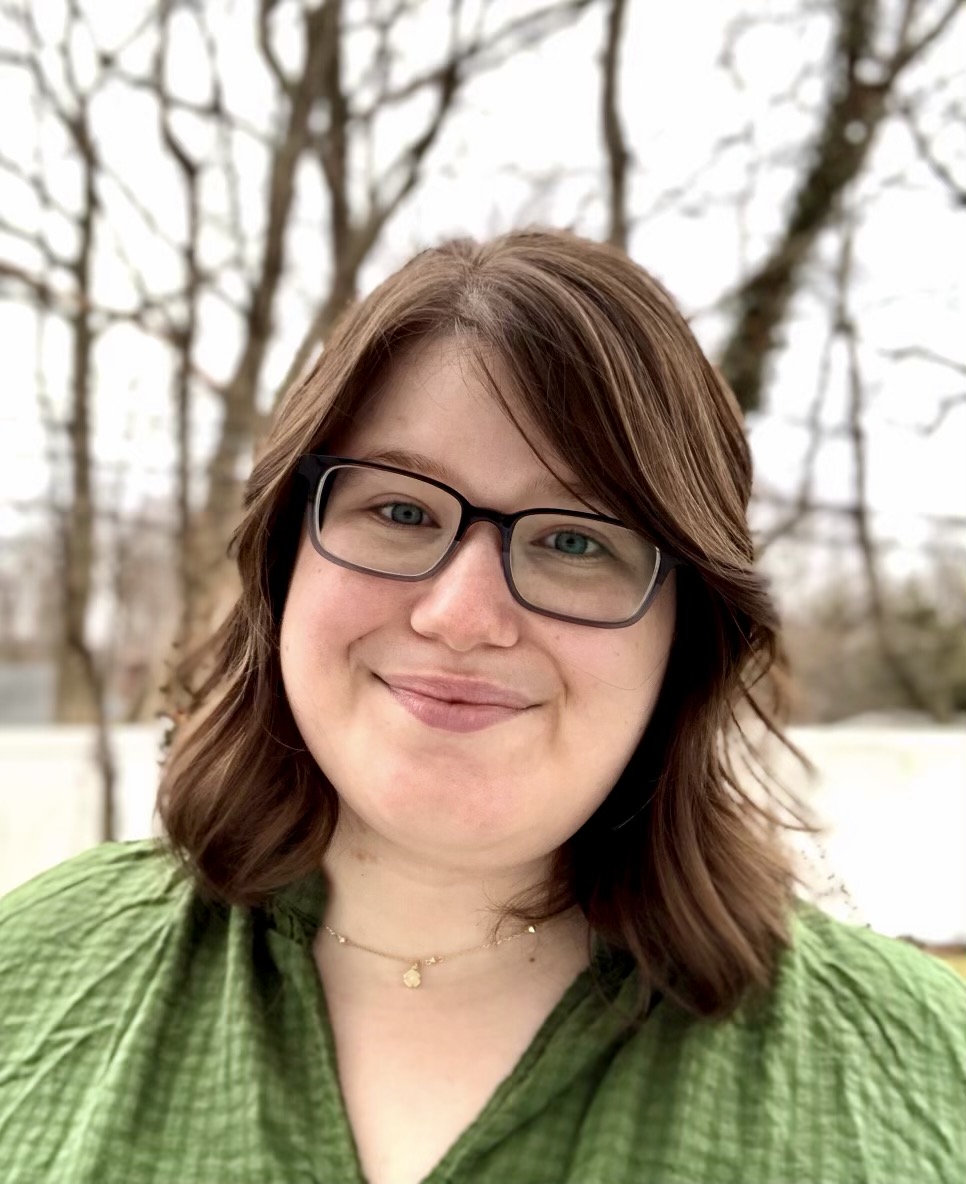 Leanne Minkoff joined the Metropolitan Campus Library as a Research & Instruction Librarian in November 2021. Before joining FDU, Leanne was a Senior Young Adult Librarian at The New York Public Library. Along with managing the Young Adult Department at her branch, Leanne also worked closely with NYPL’s College and Career Pathways program where she led college and career readiness events and offered advising to NYC teens. Leanne also has experience in makerspaces and emerging technologies from her time as a STEM Librarian at the Great Neck Library STEM Lab. Leanne received her MSLIS from Syracuse University.
Leanne Minkoff joined the Metropolitan Campus Library as a Research & Instruction Librarian in November 2021. Before joining FDU, Leanne was a Senior Young Adult Librarian at The New York Public Library. Along with managing the Young Adult Department at her branch, Leanne also worked closely with NYPL’s College and Career Pathways program where she led college and career readiness events and offered advising to NYC teens. Leanne also has experience in makerspaces and emerging technologies from her time as a STEM Librarian at the Great Neck Library STEM Lab. Leanne received her MSLIS from Syracuse University.
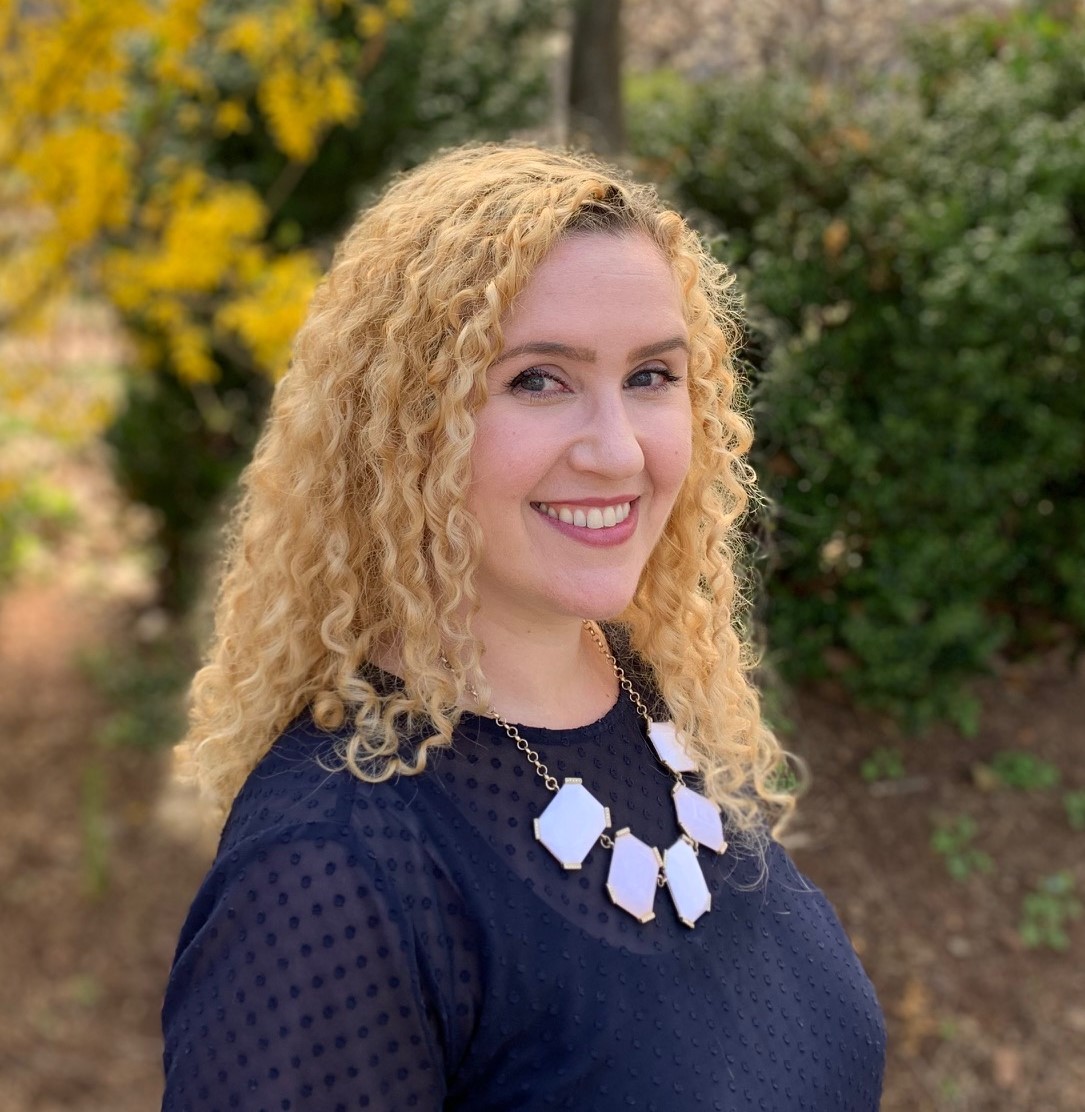 Nicole Potdevin has been promoted to Associate University Librarian for User Services. Nicole previously served as Associate University Librarian and Director of Public Services at FDU’s Florham Campus Library from 2020-2022, Acting Director of Public Services from 2017-2020, and Research & Instruction Librarian from 2016-2020. In her new position, Nicole is responsible for overseeing the operation of user services, including circulation, reference, instruction, assessment, and outreach, across FDU’s campuses.
Nicole Potdevin has been promoted to Associate University Librarian for User Services. Nicole previously served as Associate University Librarian and Director of Public Services at FDU’s Florham Campus Library from 2020-2022, Acting Director of Public Services from 2017-2020, and Research & Instruction Librarian from 2016-2020. In her new position, Nicole is responsible for overseeing the operation of user services, including circulation, reference, instruction, assessment, and outreach, across FDU’s campuses.
New Jersey Institute of Technology
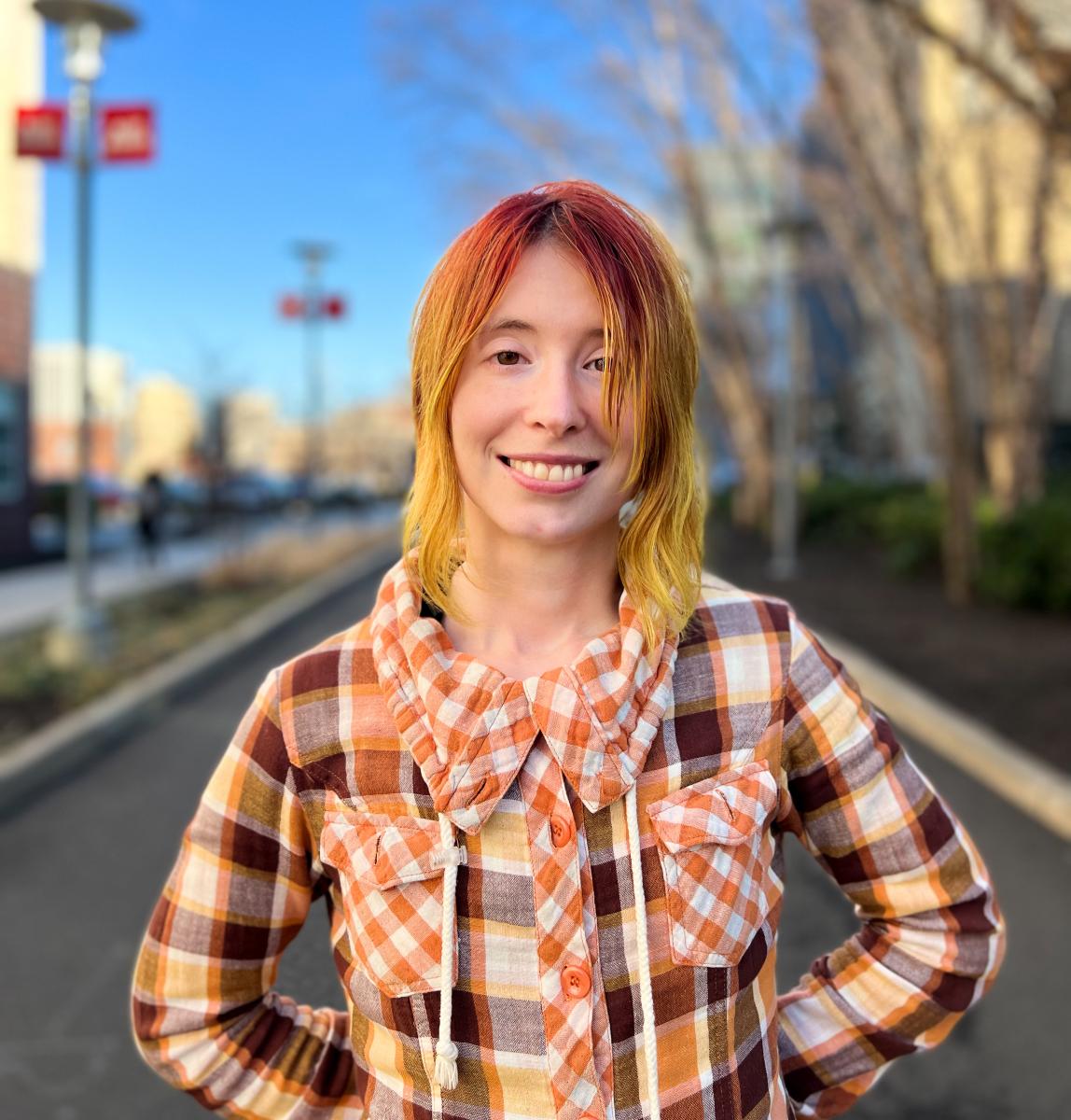 Quinn Morris-Pearson joined Robert W. Van Houten Library in August of 2021 as the Research and Instruction Librarian. She came to NJIT from Ocean County College where she was the STEM and Outreach Librarian. She focused on STEM instructions, reference services, information literacy, embedded librarianship, collection development, outreach and engagement, and library website content development. Quinn enjoys helping students and professors find information for their wildly fascinating topics and providing fun books to read.
Quinn Morris-Pearson joined Robert W. Van Houten Library in August of 2021 as the Research and Instruction Librarian. She came to NJIT from Ocean County College where she was the STEM and Outreach Librarian. She focused on STEM instructions, reference services, information literacy, embedded librarianship, collection development, outreach and engagement, and library website content development. Quinn enjoys helping students and professors find information for their wildly fascinating topics and providing fun books to read.
 John Kromer joined Robert W. Van Houten Library in February 2022 as the Associate University Librarian for Engagement & Research. He came to NJIT from Arizona State University, where he was the Library's STEM Division Head, and he has previously served as the Physical Sciences & Engineering Librarian at both Brown University and Miami University (Ohio). In his previous work, John has supported the implementation of Electronic Research Notebooks and Open Education Resources across campus. John is passionate about supporting the research and education needs of patrons, as well as supporting the well-being and development of his employees. In his free time, John plays trombone and hockey and is cat-dad to Bernadette and Cody.
John Kromer joined Robert W. Van Houten Library in February 2022 as the Associate University Librarian for Engagement & Research. He came to NJIT from Arizona State University, where he was the Library's STEM Division Head, and he has previously served as the Physical Sciences & Engineering Librarian at both Brown University and Miami University (Ohio). In his previous work, John has supported the implementation of Electronic Research Notebooks and Open Education Resources across campus. John is passionate about supporting the research and education needs of patrons, as well as supporting the well-being and development of his employees. In his free time, John plays trombone and hockey and is cat-dad to Bernadette and Cody.
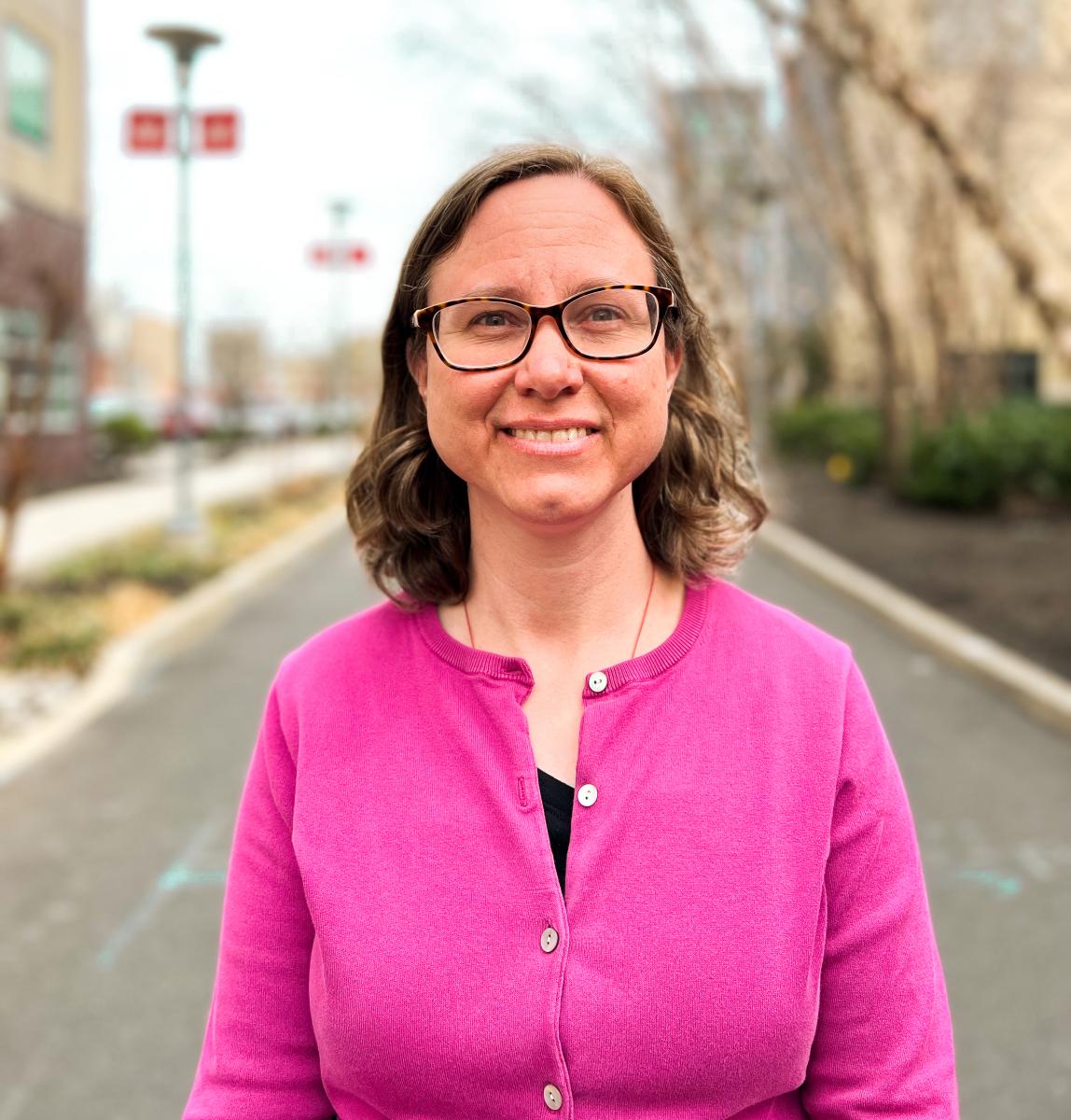 Jennifer A. King joined Robert W. Van Houten Library in March of 2022 as the Electronic Resources and Discovery Librarian. Prior to working at NJIT Jennifer was a Chat Reference Librarian at Springshare and OCLC where she answered reference questions from both academic and public libraries here in the United States and the United Kingdom. Jennifer has a background in biology and botany and loves plant taxonomy. Before becoming an academic science librarian at the Leonard Lief Library, Lehman College, City University of New York, she worked at The New York Botanical Garden cataloging and tracking the living plants collection. In addition, Jennifer is a passionate cross stitcher.
Jennifer A. King joined Robert W. Van Houten Library in March of 2022 as the Electronic Resources and Discovery Librarian. Prior to working at NJIT Jennifer was a Chat Reference Librarian at Springshare and OCLC where she answered reference questions from both academic and public libraries here in the United States and the United Kingdom. Jennifer has a background in biology and botany and loves plant taxonomy. Before becoming an academic science librarian at the Leonard Lief Library, Lehman College, City University of New York, she worked at The New York Botanical Garden cataloging and tracking the living plants collection. In addition, Jennifer is a passionate cross stitcher.
Ramapo College
Leigh Keller has been appointed as Dean of the George T. Potter Library and Peter P. Mercer Learning Commons. Keller joined Ramapo in 2004 as a librarian of the George T. Potter Library and has served as Interim Director since 2019. Keller earned her Master of Library and Information Science from Drexel University in Philadelphia and holds a B.A. in English from George Mason University in Fairfax, Virginia.
Raritan Valley Community College
The Evelyn S. Field Library at Raritan Valley Community College welcomes Alissa Renales (they/them/theirs) to our Instructional Services team. Alissa completed their graduate work in Information with a concentration in Archives and Preservation from Rutgers University, New Brunswick in January, 2022. They have worked in public and academic libraries prior to joining the RVCC community. In addition to their Reference and Instruction responsibilities, Alissa acts as the library's liaison to the college's DEI Committee. Their professional background also includes internships at the Princeton University Art Museum in the Information Technology department, the Metropolitan Museum of Art in New York City, and most recently a joint internship between Muhlenberg College's Special Collections department and the Bradbury-Sullivan LGBT Community Center as the LGBT Community Archivist Intern. They are an Academic Reference volunteer for the State Library of Oregon's Answerland reference cooperative which provides reference services to international patrons. Alissa sits on the Quality Control Team, a select group of volunteers, which oversees the cooperative's mentoring program, provides best practices and tips to increase the efficacy of reference interactions, in addition to running the Notable Transcript Awards for outstanding reference interactions.
Rider University
Prof. Melissa A. Hofmann and Dr. Sharon Whitfield (co-grantees) would like to announce that Rider University was the recipient of the Albertine Cinémathèque French Film Festival, which is made possible with the support of the Cultural Services of the French Embassy in the U.S., the Centre National du Cinéma et de l’Image Animée (CNC), the French American Cultural Fund, Florence Gould Foundation and Highbrow Entertainment. Funding from the Albertine Cinémathèque, allows Rider University to screen a series of six films drawn from across the French-speaking world via Zoom. For more information, go to https://guides.rider.edu/albertine.
The College of New Jersey
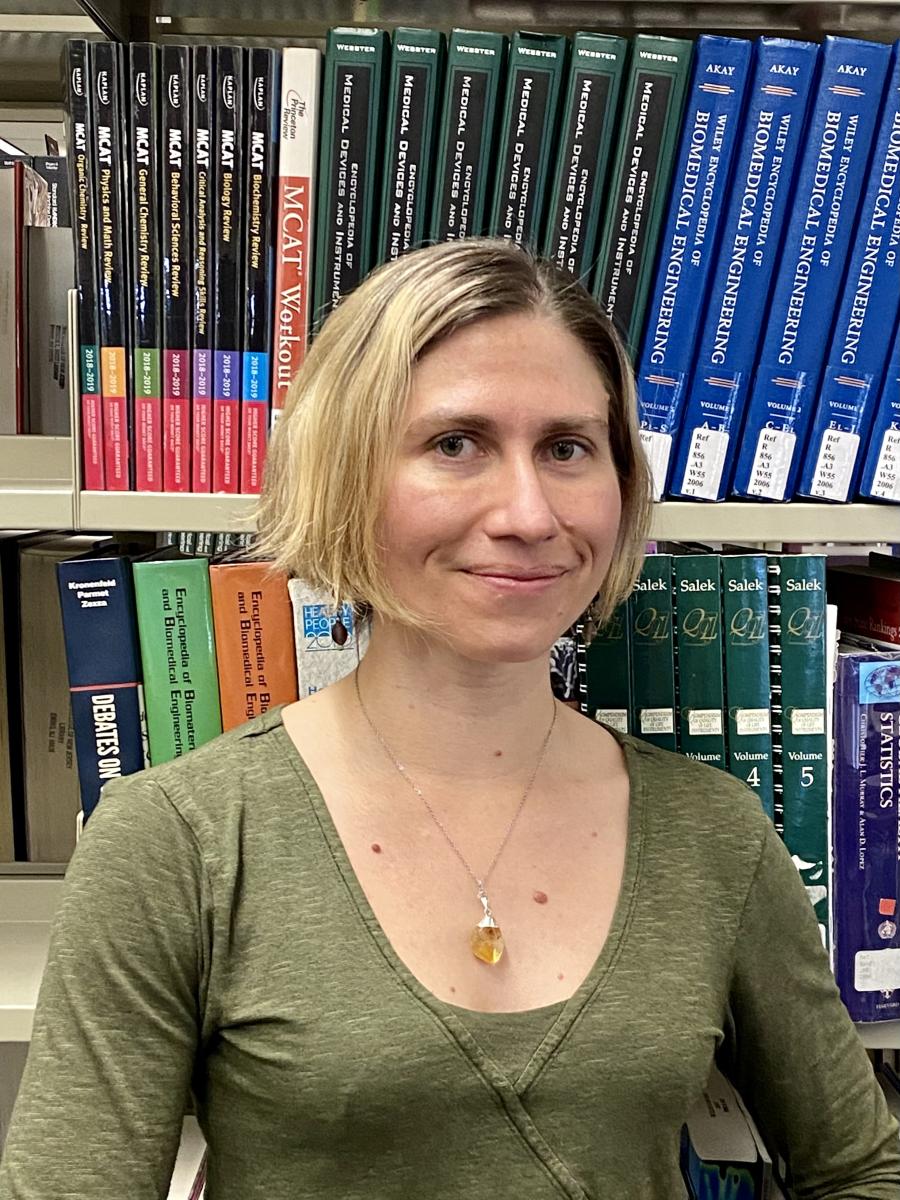 Dr. Rebeca Jefferson has joined R. Gitenstein Library as the Health & Life Sciences Librarian. Rebeca received her MA in Library and Information Science from UW-Madison. Rebeca's experience in libraries and information management includes digital asset management and research support at Promega Corporation, a Wisconsin-based global biotech company that makes luciferase and other laboratory products, and as a reference assistant at UW's Ebling Health Sciences Library. Rebeca holds an MD from the University of Minnesota-Twin Cities and was a practicing psychiatrist for 8 years. As a faculty member at the University of Wisconsin School of Medicine and Public Health, Dr. Jefferson redesigned and taught the cultural competency curriculum for second year psychiatry residents, coordinated the PTSD educational seminar series for psychiatry and pharmacy residents, and was involved in teaching cross-disciplinary course work to a wide variety of health professions students.
Dr. Rebeca Jefferson has joined R. Gitenstein Library as the Health & Life Sciences Librarian. Rebeca received her MA in Library and Information Science from UW-Madison. Rebeca's experience in libraries and information management includes digital asset management and research support at Promega Corporation, a Wisconsin-based global biotech company that makes luciferase and other laboratory products, and as a reference assistant at UW's Ebling Health Sciences Library. Rebeca holds an MD from the University of Minnesota-Twin Cities and was a practicing psychiatrist for 8 years. As a faculty member at the University of Wisconsin School of Medicine and Public Health, Dr. Jefferson redesigned and taught the cultural competency curriculum for second year psychiatry residents, coordinated the PTSD educational seminar series for psychiatry and pharmacy residents, and was involved in teaching cross-disciplinary course work to a wide variety of health professions students.
New Teaching Resource: “Information Literacy Through Entrepreneurial Thinking: Activities for Teaching Across the Disciplines”
By Michelle Kowalsky and Andrea Baer
Michelle Kowalsky and Andrea Baer (Campbell Library, Rowan University, Glassboro, NJ) have created the teaching resource “Information Literacy Through Entrepreneurial Thinking: Activities for Teaching Across the Disciplines.”
The activities in “Information Literacy Through Entrepreneurial Thinking” are intended to support students in developing their information literacy and research skills through entrepreneurial thinking, as well as to support the university in integrating information literacy, critical thinking, and principles of innovation and entrepreneurship across the Rowan curriculum. Entrepreneurial thinking draws on divergent thinking, as individuals explore, experiment, and consider problems and possible solutions from many angles, including those of individuals and groups that are likely to be invested in the problem or question at hand. An entrepreneurial mindset can help students embrace a creative, goal-driven approach to problem solving and find new and better solutions to global, local, and personal challenges.
The activities in “Information Literacy Through Entrepreneurial Thinking” illustrate how entrepreneurial thinking and information literacy share many of the same metacognitive, critical thinking, and behavioral skills that students need to be successful in school and in life. The sample activities include discussion prompts and activities that are relevant across academic disciplines and programs, and that also apply to everyday experiences. For example, students can generate keywords and subject terms as they brainstorm different words for sneakers; take on the role of people talking at a party, as they identify the arguments made in sources and explore how those arguments reflect a larger “conversation”; create maps or diagrams that reflect the different “information neighborhoods” where students find sources; or draw cartoons that reflect students’ understandings of the research process. The activities are designed to draw out and build on students' previous experiences and knowledge; to introduce new ways of approaching inquiry and source-based research; and to encourage engagement and shared skill development, ideally making research fun, interesting, and meaningful.
Generation Z: Providing Services to the “Instant” Generation in Higher Education
 By Neil D. Grimes, Education & Curriculum Materials Librarian, William Paterson University
By Neil D. Grimes, Education & Curriculum Materials Librarian, William Paterson University
Being part of the Millennial Generation, also known as Generation Y, has helped to shape the way I experience and interact with technology in my everyday life. My experiences are different than other generations' experiences. This article seeks to answer the following question: What insights can be learned from providing services and support to Generation Z, most of our current students in higher education today?
Before this question can be answered, Generation Z needs to be defined. Generation Z consists of students born between 1995-2010 and their preferences as well as the ways in which they interact with technology in the world is completely different than other generations. Dayna Bradstreet, assistant director of admission at Simmons College in Boston indicated that “Generation Z expects instant answers to their every question” (Loveland, 2022, passage 15). This instant demand for service and answers can help to label Generation Z as the “Instant” Generation. Furthermore, these students are entrepreneurial, desire practical skills with their education, and are concerned with the cost of college (Loveland, 2022). Many more students in this generation are going to community colleges because there is more of a conscious decision to look at cost as a major factor in students’ college choice decisions (Loveland, 2022)
Further insights about Generation Z can be drawn from the highlights of a Northeastern University (MA) 2014 study (Loveland, 2022):
-
85% have an interest in learning about financial literacy
-
81% believe that college is critical to starting a career
-
79% want to integrate their higher education experience with employer internships
-
72% want a more customized college experience that allows students to design their own course of study or major
-
67% indicate their top concern is college affordability
-
63% have a desire to learn about entrepreneurship
-
42% expect to work for themselves at some point in their career
These insights can help to inform academic librarians, higher education faculty, and staff across departments and divisions as to what the current needs and desires are of Generation Z students. These needs and desires can help to shape their college experiences. For example, academic libraries and librarians should consider creating a LibGuide with financial literacy and entrepreneurship resources as a way to help educate Generation Z students on topics they are interested in learning more about.
Saint Peter's University Library Celebrates March Madness
By Daisy DeCoster
2022 was always going to be a special year for Saint Peter’s University. Founded in 1872, Saint Peter’s has been engaged in a yearlong celebration of its 150th anniversary, with projects and events centered around the sesquicentennial theme of “opportunities for generations.” May 2021 through July 2022 also marks the “Ignatian Year,” the 500th anniversary of the conversion of the founder of the Jesuits, Saint Ignatius of Loyola, a further occasion for celebration and reflection on our institutional history and identity. So this March, as the Saint Peter’s University men’s basketball team stole headlines and shocked sports fans around the country, it all seemed a bit like divine providence, like part of a greater plan. 2022 is our year!
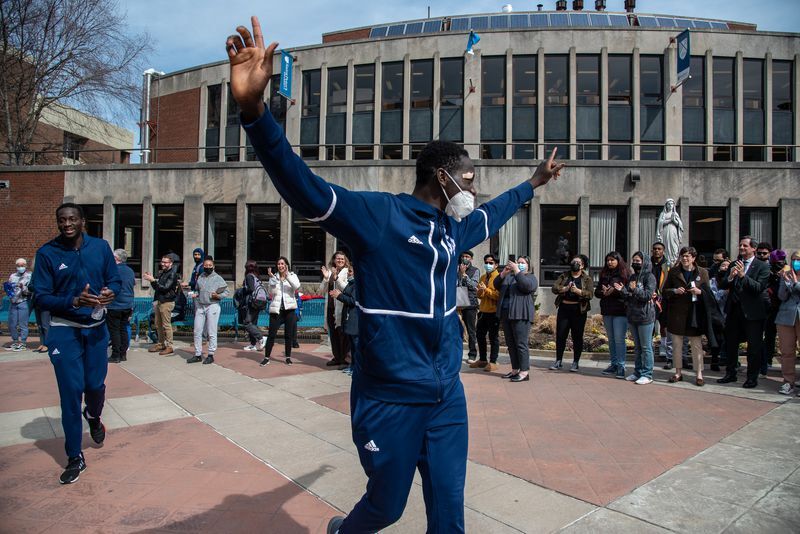
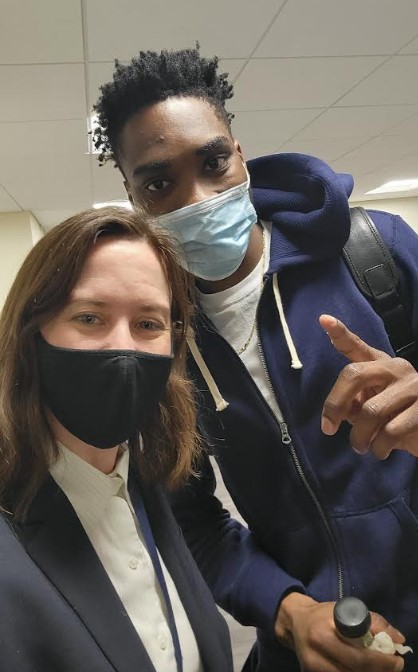
Left: Faculty, staff, and students gathered in front of the O'Toole Library on March 15 to cheer the Peacocks men's basketball team as they depart for Indianapolis to face Kentucky in the first round of the NCAA tournament.
Right: Senior, KC Ndefo and Library Director, Daisy DeCoster. KC visited the library for research instruction two days after defeating Murray State in the NCAA tournament!
Librarians and library staff were swept into March madness as soon as the Saint Peter’s men’s basketball team won the MAAC tournament by defeating Monmouth University in a thrilling game held at the Jim Whelan Boardwalk Hall in Atlantic City. The Peacocks were going to the big dance! Just making the tournament felt like a win for our small program, but what were our chances against one of college basketball’s “blue bloods,” the #2 seed Kentucky Wildcats? The oddsmakers had Saint Peter’s losing by 18 points. Most of the library staff were around when Saint Peter’s made the tournament in 2011, losing to Purdue by 22 points in the first round. Could this year, this very special year, be any different?
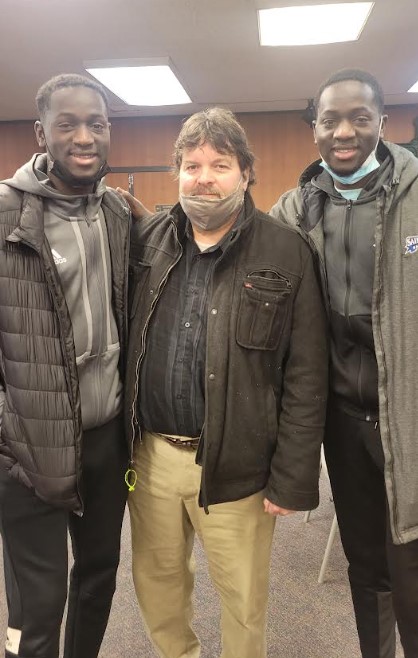
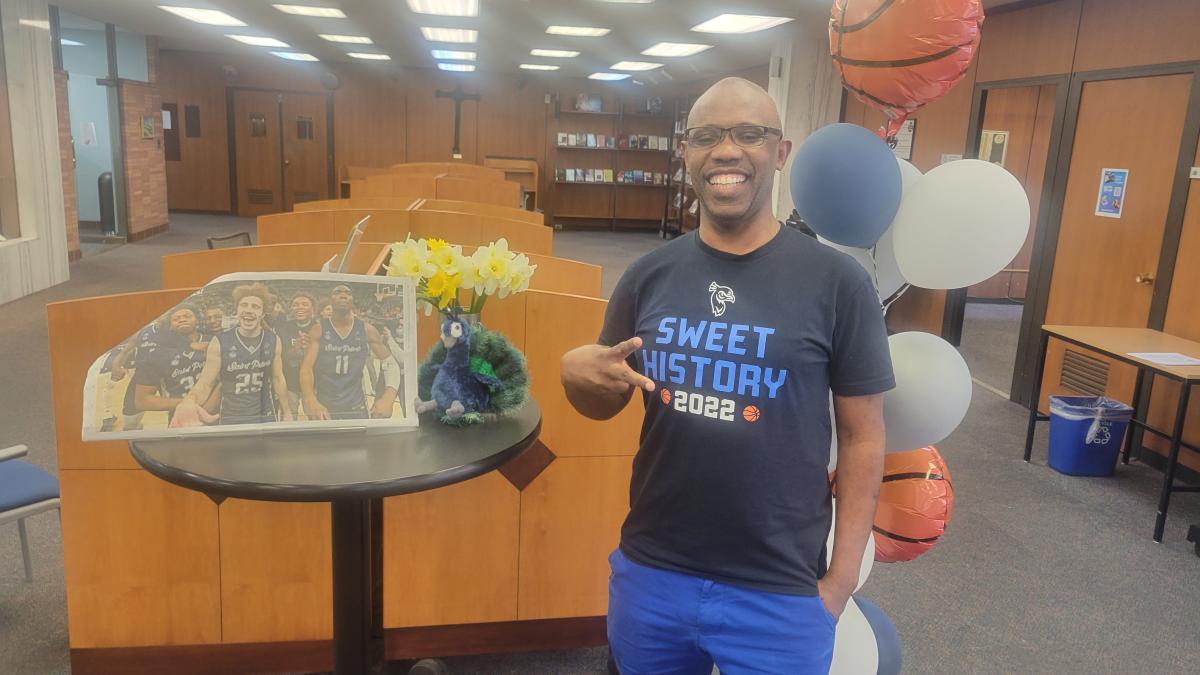
Left: Librarian, Scott Kushner with library regulars and sophomores, Fousseyni Drame and Hassan Drame.
Right: Library technician, Gilbert Monyancha celebrates the Peacock's success at a University Open House on March 27.
On March 15, students, faculty, and staff stood outside the O’Toole Library at noon to cheer the men’s basketball team as they walked from the Yanitelli Center to their bus on Montgomery Avenue, waiting to transport them to Newark airport then off to Indianapolis to face Kentucky in the first round. The game was thrilling, and we were glued to our televisions. When the score was tied at halftime, university president Eugene Cornacchia, who was at the game, tweeted a picture of a medallion with hands clasped in prayer, asking “Do you believe?” We did! Having witnessed these student-athletes in the library and on the court, we were familiar with their tenacity and their selfless, tough-minded approach to the task at hand. So when the game was over and the sports world seemed in shock and disbelief, we were proud as Peacocks! The madness continued in Indianapolis, as Saint Peter’s defeated the 7th seed Murray State by 10 points. The Peacocks had made history as the first MAAC conference team to make the Sweet Sixteen, and the next game would be held 90 miles away from campus, in Philadelphia.
LibraryLinkNJ Spring & Summer Events
The team at LibraryLinkNJ is gearing up for a few months packed full of professional development, continuing education, and even some summer fun! Staff at all New Jersey libraries (including academic, special, and K-12!) are welcome to create a LibraryLinkNJ online account and take advantage of what we offer, including our free webinars and events. If you haven’t taken advantage of LibraryLinkNJ before, or if it’s been a while, now is a great time to get your account set up and join us!
Visit https://librarylinknj.org/user/login to sign in or create a new account!

And take a look below to find out what’s already on our calendar, plus get a sneak peek at what’s in the works:
Webinars and Events
-
Cybersecurity Basics for Library Staff; May 10th at 2PM
-
Skill-Sharing Conversation: Outreach to Immigrant Communities; May 12th at 11AM
-
LibraryLinkNJ Membership Meeting; June 21st at 2PM
MentorNJ Meetups
-
Adventures in Administration; May 5th and 19th at 10:30AM
-
Asian/Pacific Islander Meetup; May 12th at 10AM
-
Support for Intellectual Freedom Fighters; May 17 at 4PM
-
School Libraries: Wrapping Up Your School year; May 25 @ 4:30PM
Visit the events calendar on our website at https://librarylinknj.org/calendar for details and registration information for any of the above events!
LLNJ at the NJLA Conference:
LibraryLinkNJ is a proud sponsor of the upcoming NJLA Conference, “Embracing Opportunity.” Visit our exhibitor booth at any time during the conference to chat with LLNJ staff, or find us at one of the programs listed below!
-
Ready for Anything? Successful Resiliency Grants from LibraryLinkNJ; June 2nd at 11AM
-
MentorNJ Asian/Pacific Islander In-Person Meetup; June 2nd at 3:30PM
-
MentorNJ Adventures in Administration In-Person Meetup; June 2nd at 4:10PM
-
LibraryLinkNJ: More Than You Knew; June 3rd at 9AM
Sneak Peek:
Keep an eye on our calendar for the events below, currently in the works!
-
Free, virtual Mental Health First Aid training for library staff
-
Additional events in our Cybersecurity for Libraries webinar series
-
New Skill-Sharing Conversation topics
-
And our first ever “Summer Book Bash” - Summer fun exclusively for NJ library staff featuring free virtual author visits, publisher previews, reading challenges, and more!
Create your LLNJ account on our website to get our weekly “On Our Calendar” email so that you never miss an event announcement, or follow us on Facebook, Twitter, and Instagram @librarylinknj.
Questions? Reach out to our Continuing Education team at ce@librarylinknj.org
Suggestions? Send them our way at suggestionbox@librarylinknj.org
From Antarctica to Outer Space - My Summer Research Internship at the Law Library of Congress
By Sophia Guido
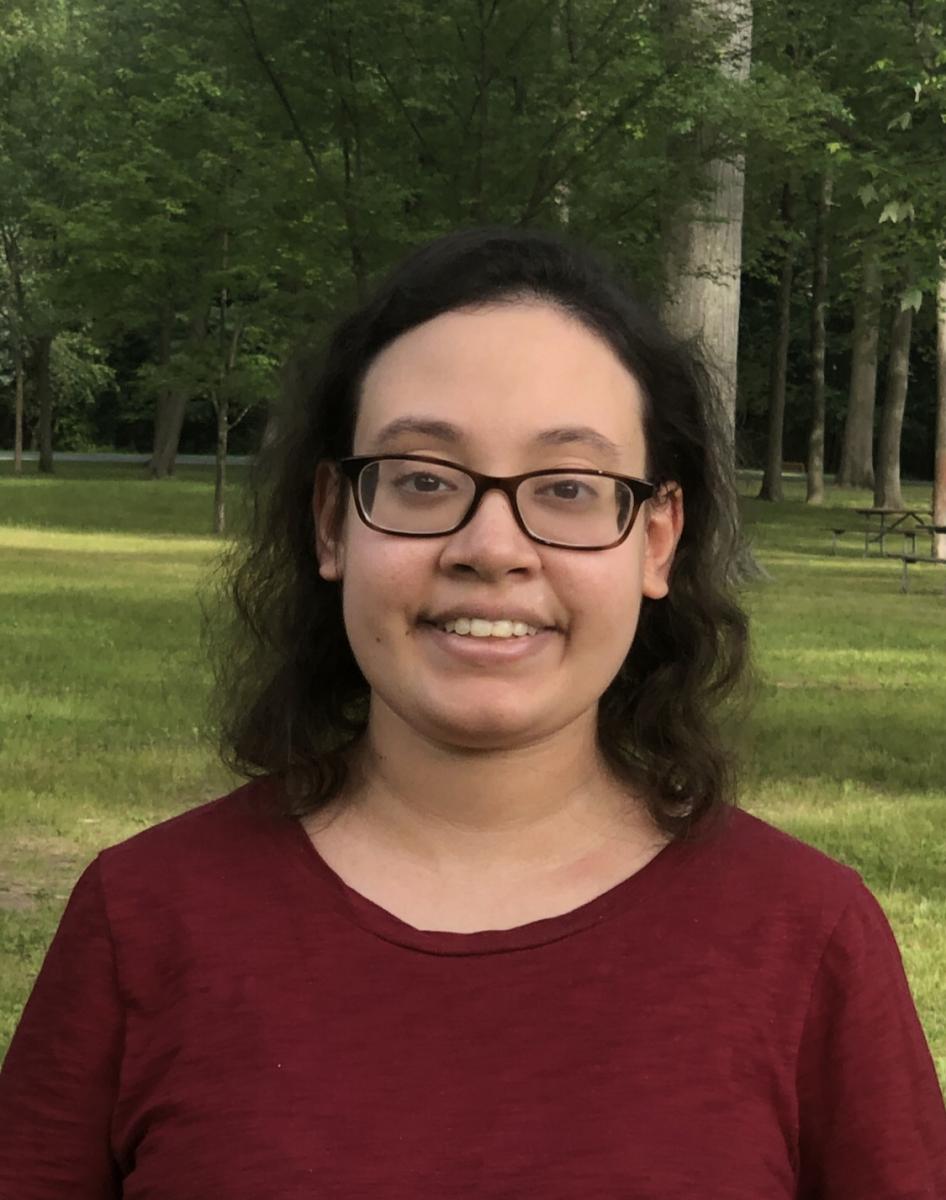 This past January, I published a blog in the Law Library of Congress’ In Custodia Legis titled: “How the Antarctic Treaty of 1959 Influenced the Outer Space Treaty of 1967”. This blog was the product of an online internship I completed last summer with the Law Library of Congress’ Digital Resources Division. After graduating from Rutgers’ Master of Information program in May 2021, I was looking for an opportunity to gain more experience in research and writing, and to learn first-hand how institutions use their catalogs and collections to produce accessible content and highlight important topics.
This past January, I published a blog in the Law Library of Congress’ In Custodia Legis titled: “How the Antarctic Treaty of 1959 Influenced the Outer Space Treaty of 1967”. This blog was the product of an online internship I completed last summer with the Law Library of Congress’ Digital Resources Division. After graduating from Rutgers’ Master of Information program in May 2021, I was looking for an opportunity to gain more experience in research and writing, and to learn first-hand how institutions use their catalogs and collections to produce accessible content and highlight important topics.
The internship consisted of writing two blogs and creating a story map on a legal topic of choice using sources from the Library of Congress’ catalog. As an Environmental Science major during my time as an undergraduate at Muhlenberg College (2015-2019), I decided to choose a topic in environmental law. I identified Antarctica as a unique topic in this field given the numerous international agreements that have been signed over the years to protect the continent’s environment and wildlife from exploitation, claims of territorial sovereignty, and other threats. During my initial research phase, I used the Library of Congress’ collections as well as national and international government websites to access the original treaties and read numerous historical documents about their formation and legacy. As I dug further, I learned how the Antarctica Treaty System influenced the international treaties involving outer space and wanted to learn more about this relationship, which became the focus of my published blog. While drafting my blog posts, I consulted numerous sources from the Library of Congress’ catalogs and collections, which gave me an appreciation for the role of comprehensive, well-organized public collections that span time and geography.
My published blog, “How the Antarctic Treaty of 1959 Influenced the Outer Space Treaty of 1967”, examines the history of the Outer Space Treaty of 1967, the similarities and differences between the Outer Space Treaty and the Antarctic Treaty of 1959, and the advancements that have been made since the Outer Space Treaty was ratified. Both international treaties provide guidelines for peaceful and cooperative scientific research and exploration on the continent of Antarctica and in outer space. These have set a precedent for future international agreements and continue to be relevant in discussions today. On January 28th, my blog was published in recognition of the 55th anniversary of the signing of the Outer Space Treaty of 1967.
Sophia Guido is a Part-Time Reference Librarian at Ramapo College of New Jersey. She can be reached at sguido1@ramapo.edu.
Usability Testing in a Pandemic: A Tale of Two Approaches
By Eric Jeitner and Linda Salvesen
Even as many higher education institutions in New Jersey continue to open, it seems that both virtual and hybrid learning are here to stay, at least to some degree. One important library process that has been greatly altered by the pandemic is usability testing—arguably, an operation more important than ever, as many of our patrons continue to rely heavily on our libraries’ virtual services. Since the authors recently navigated this environment to conduct usability studies at each of their respective libraries, despite the challenges presented, they wanted to share their experiences so you could try it at your library!
For reference, both studies occurred within the 2021-2022 academic year: Eric Jeitner conducted a website usability study in Fall 2021 at Stockton University’s Richard E. Bjork Library, while Linda Salvesen conducted a discovery usability study in Spring 2022 at William Paterson University of New Jersey’s David & Lorraine Cheng Library.
This collaboration was initiated since both are from libraries that are members of the New Jersey Academic Library Network (NJALN), which is a consortium of academic libraries within NJ that implemented the same ILS together and now maintain a shared lending network. Implementing an ILS as a group has become more common recently, and it provides an opportunity for partnership between institutions.
Similarities between these two usability studies include the fact that each of the respective institutions required IRB approval before these studies could begin–this ensured that subject privacy and confidentiality of data was strictly maintained, including anonymizing all data and recordings. Both studies also utilized Zoom, where the platform’s screen capture capabilities were used to record both video and audio.
In terms of methodology, both studies also utilized the Talk Aloud Protocol paired with task-completion exercises. Subjects were given a list of scenarios that required them to interact with the online library tool being evaluated. Great care was taken in designing the questions as well as not leading the participants’ thinking or subtly directing them towards successful task completion. Outside of the tasks, subjects were asked about their library instruction history and provided the opportunity to ask the interviewer debriefing questions pertaining to the tasks.
In both cases, recruitment was the biggest challenge, by far. While flyers were created and displayed around each campus, posts were made on social media or in campus announcement emails, and incentives were offered, the biggest drivers of participation were personal connections and the spread via word-of-mouth.
News from SCARLA
By Erin Mustard
On April 21, SCARLA (Student College, Academic and Research Libraries Association) at Rutgers University hosted an online panel discussion to over twenty-five attendees at Life After SC&I: A Panel Discussion with Rutgers Alums in Higher Education. The four panelists, all alumni of the Rutgers MI program (previously MLIS), generously shared their experiences as students and their perspectives on finding a job in academic and research libraries.
The panelists were: Erin Ackerman, Gabriella Shriner, Jennifer Hunter, and Diana Floegel. Erin Ackerman has a PhD in Political Science from The Johns Hopkins University, and a MLIS from Rutgers, and is the Interim Assistant Director for Public Services and Social Sciences Librarian at The College of New Jersey's R. Barbara Gitenstein Library. Gabriella Shriner is a current PhD student at the University of Arizona, with research interests in online communities, accessibility and inclusion, and the intersection of communication studies in information and library science; and holds an MI from Rutgers. Jennifer Hunter has BA, MA, and MLIS, all from Rutgers, and is currently the Head of Firestone General Service Operations for Princeton University Library. Diana Floegel has a PhD in Information, Communication, and Media from Rutgers, and is currently a Senior Regulatory Analyst for the Institutional Review Board at the University of Pennsylvania.
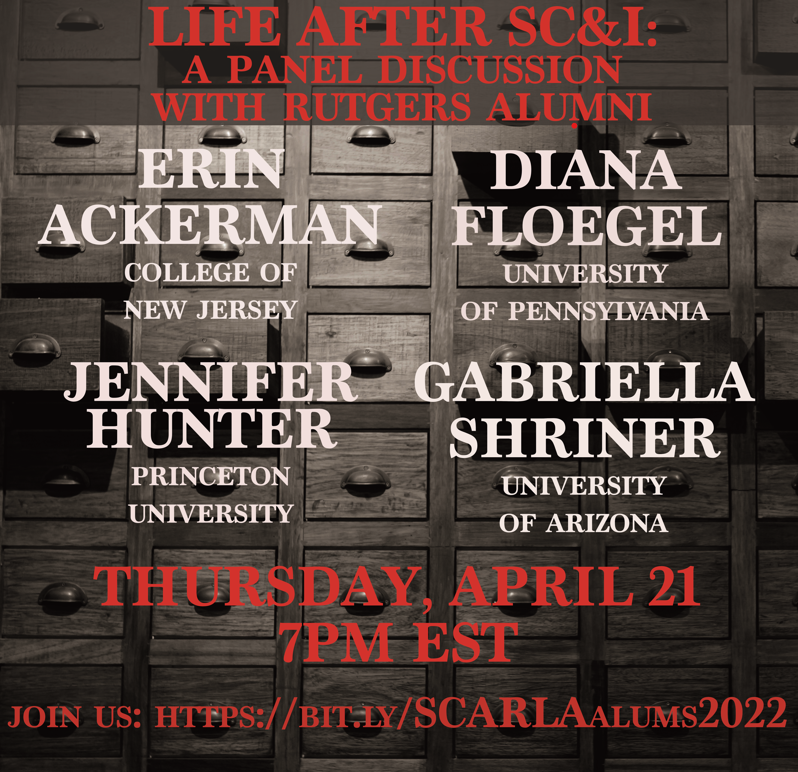
The panelists answered many questions from SCARLA, and the MI and PhD students in attendance. They provided many insights on the job market and their expectations, and experiences, moving from academic life to working in an academic library. The panelists emphasized that networking was one of the most important skills to develop in the job search, and that often this can be done by keeping in touch with professors, other students, or simply reaching out to librarians and starting a conversation. They shared many positive stories of shared interests, conversations, and working relationships that contributed to their current position, and building a supportive community. They also shared some of their strategies for applications, specifically, writing a strong cover letter that translates the applicant’s skills to the job requirements and modifying your resume for each application, emphasizing the skills and experiences that best fit the job description. They also reinforced the importance of getting experience in any way possible, whether through paid or for-credit internships, or volunteering. Many current students were interested in the process of transitioning to academic libraries from other jobs or fields of study, and the panelists shared their experiences with the process, ranging from considerations of family, geography, and keeping up with connections.
SCARLA is very grateful for their panelists’ insights and experiences, as well as extremely proud of this successful event. They are planning to provide more alumni panels in the upcoming fall semester.
SCARLA’s president is Wafa Isfahani, Victoria Sun is the vice-president, Erin Mustard is the secretary/webmaster, and Nicole Willis is the treasurer. The group is advised by Dr. Marie Radford and Dr. Gretchen Stahlman.
If you are interested in joining SCARLA or attending our future events, you can join our listserv by sending an email to comminfo_scarla-join@email.rutgers.edu, with the word “subscribe” as the subject line. You can also email one of SCARLA’s faculty advisors, Dr. Marie Radford at mradford@comminfo.rutgers.edu, or Dr. Gretchen Stahlman at gs838@comminfo.rutgers.edu.
If you have an employment or internship opportunity you would like to post to the SC&I Job Board, please email details to Ildi Koczan, Assistant Director of Student Services for Careers at ildi.koczan@rutgers.edu.
Rider University’s Moore Library Selected For Competitive Federal Humanities Grant
$10,000 Grant Will Help the Library Recover from the Coronavirus Pandemic
Rider University’s Moore Library has been selected as one of 200 libraries nationwide for the American Library Association’s American Rescue Plan: Humanities Grants for Libraries opportunity, an emergency relief program to assist libraries that have been adversely affected by the pandemic.
With funding from the National Endowment for the Humanities (NEH) through the American Rescue Plan Act of 2021, Rider University will use funds to anchor itself in the community as a strong humanities institution. The competitive award comes with a $10,000 grant that will help the library deliver excellent programs and services related to culture, history, literature, and other humanities subjects.
More than 370 libraries applied for the grant, according to ALA. View the full list of selected libraries.
The participating libraries, selected through a competitive, peer-reviewed application process, include public libraries, academic/college libraries, K-12 libraries, and tribal, special and prison libraries. The recipients represent 45 states and Puerto Rico and serve communities ranging in size from 642 residents in Weir, Kansas, to the city of Los Angeles. Libraries were chosen with an emphasis on reaching historically underserved and/or rural communities.
Librarian Dr. Sharon Whitfield stated, “The pandemic exacerbated Moore Library’s growing issues to support humanities curriculum through library materials and programming. Yet, the library remains committed to being a supportive place and providing a vehicle for students to engage in out-of-classroom learning experiences. What better place to offer these experiences than the university library, where faculty, staff, and students of all disciplines can come together to engage each other and synergize around important humanities topics. This grant will allow us to continue to offer humanities programming.”
Rider University’s Moore Library will use the grant funds to offer immersive topical exploration in the following areas: Holocaust/Jewish Studies, Black/African American History, the Refugee Experience, the Racial Justice Movement, and Homelessness/the Houseless. Each topical exploration will begin with a virtual reality experience using Oculus headsets. “Our hope is to launch our first topical exploration in April”, said Dr. Whitfield. During the first topical exploration, virtual reality headsets will transport attendees to Anne Frank’s Secret Annex. For more information about the topical exploration of Anne Frank, go to: https://guides.rider.edu/holocaust/annefrankVR
“Libraries have faced significant hardships throughout the pandemic —from budget cuts to staff furloughs to building closures — especially in our communities of the greatest need,” said ALA President Patty Wong. “This crucial support from NEH will enable our beloved institutions, and the dedicated people who run them, to rebuild and emerge from the pandemic stronger than ever.”
American Rescue Plan: Humanities Grants for Libraries is an initiative of the American Library Association (ALA) made possible with funding from the National Endowment for the Humanities (NEH) through the American Rescue Plan Act of 2021."
For more information about the immersive topical experiences, please contact Dr. Sharon Whitfield (swhitfield@rider.edu) or Prof. Melissa A. Hofmann (mhofmann@rider.edu).
The Year of Tiger at Union County College
By Jane Jiang
Union County College has a very diverse community. To celebrate Lunar New Year — Year of Tiger, the Library held a Paper-Cutting Workshop for all students and faculty. Many people attended and enjoyed themselves. Attendees learned about Asian culture and customs, which are very different from American culture, and they agreed that it’s good to know about other people and cultures. Many wanted to know more, and some professors asked if the library can bring more events like this to their classroom.
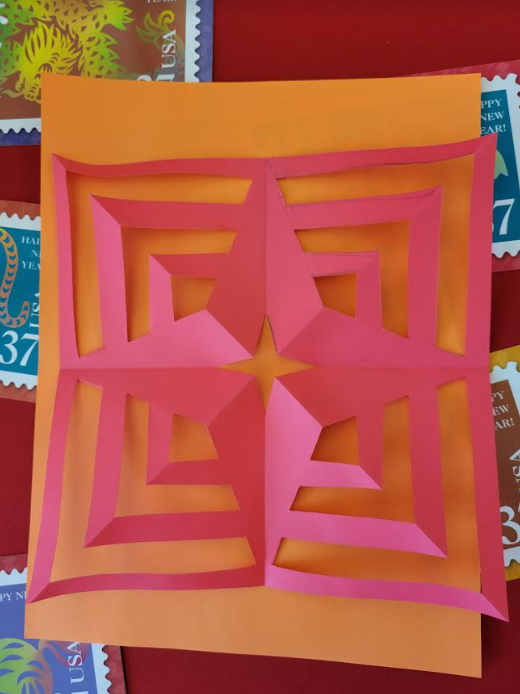
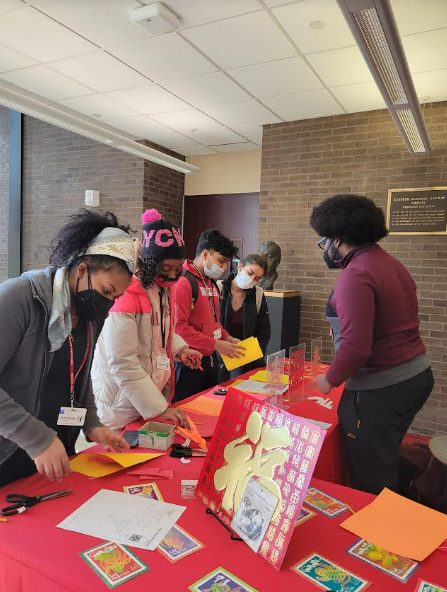
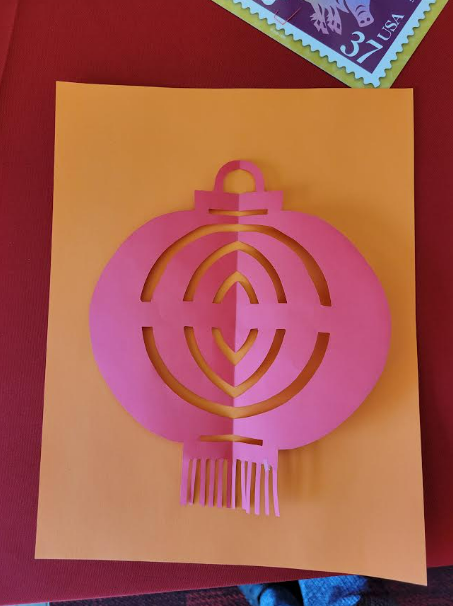
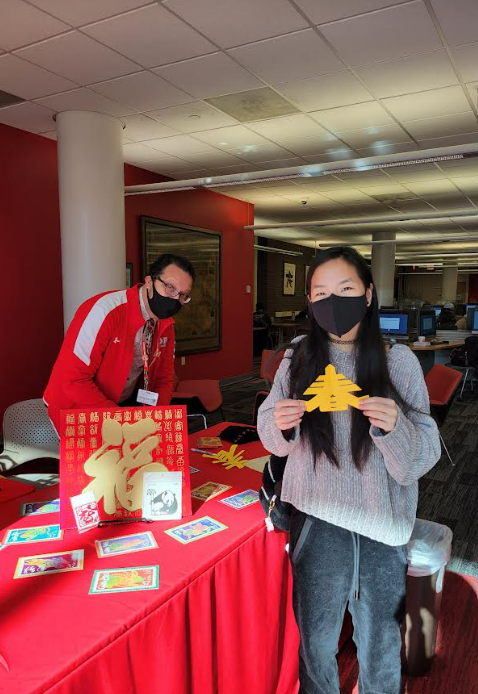
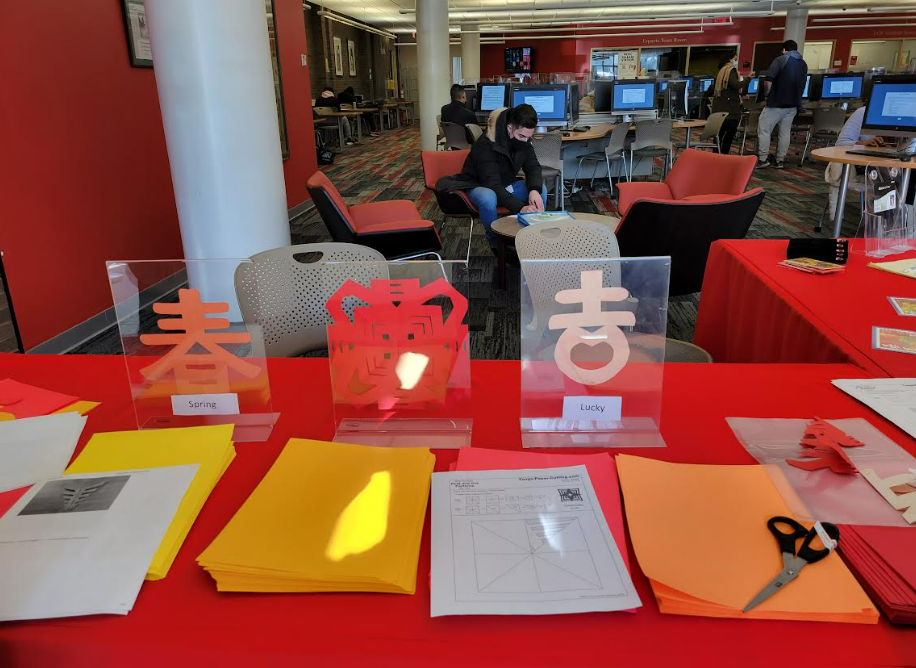
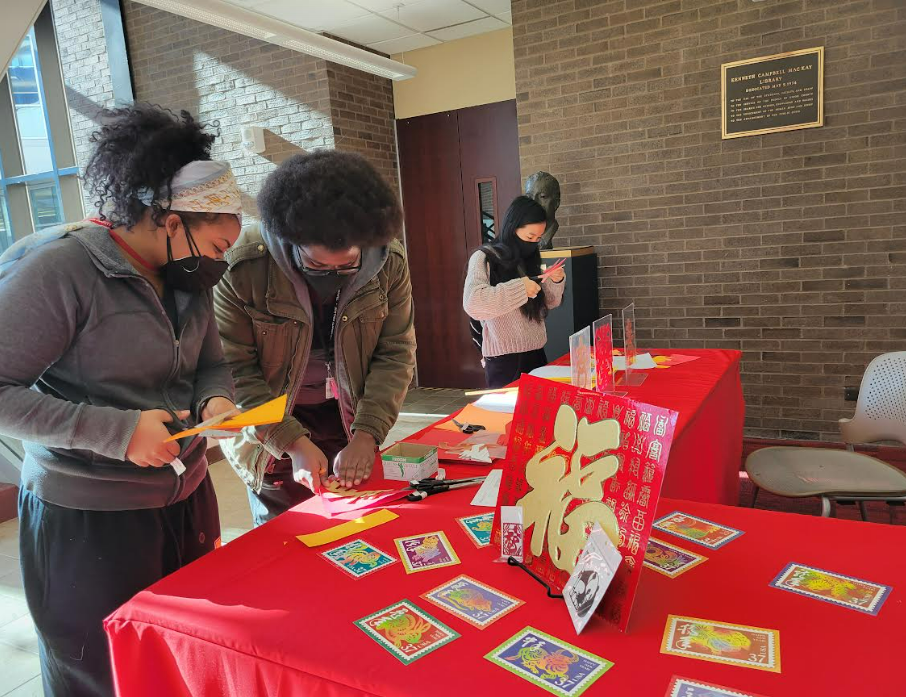
Jane Jiang is the Director of Libraries at Union County College, and can be reached at yu.jiang@ucc.edu.
TikTok: Time to Meet Stockton Students Where They Are
By Jessica Chamberlain, Joyce DeStasio, & Sarah Hanlon
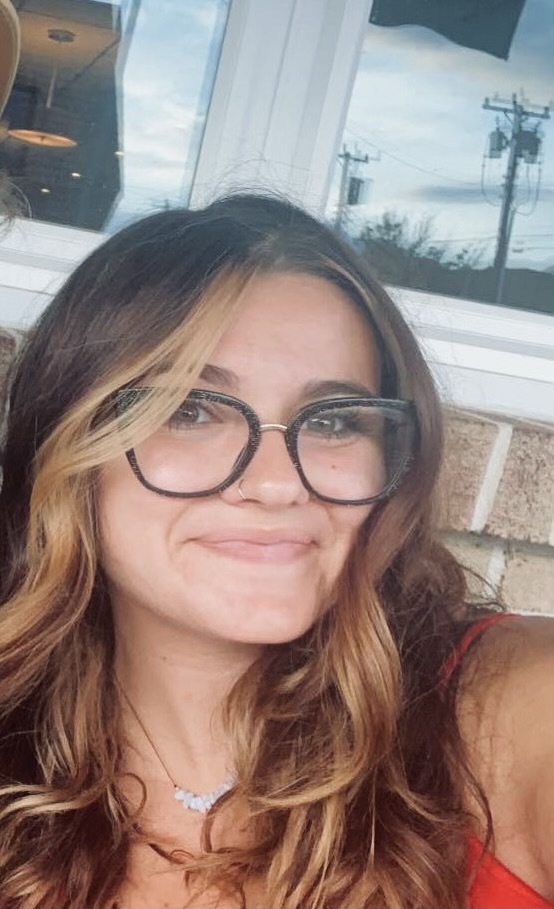
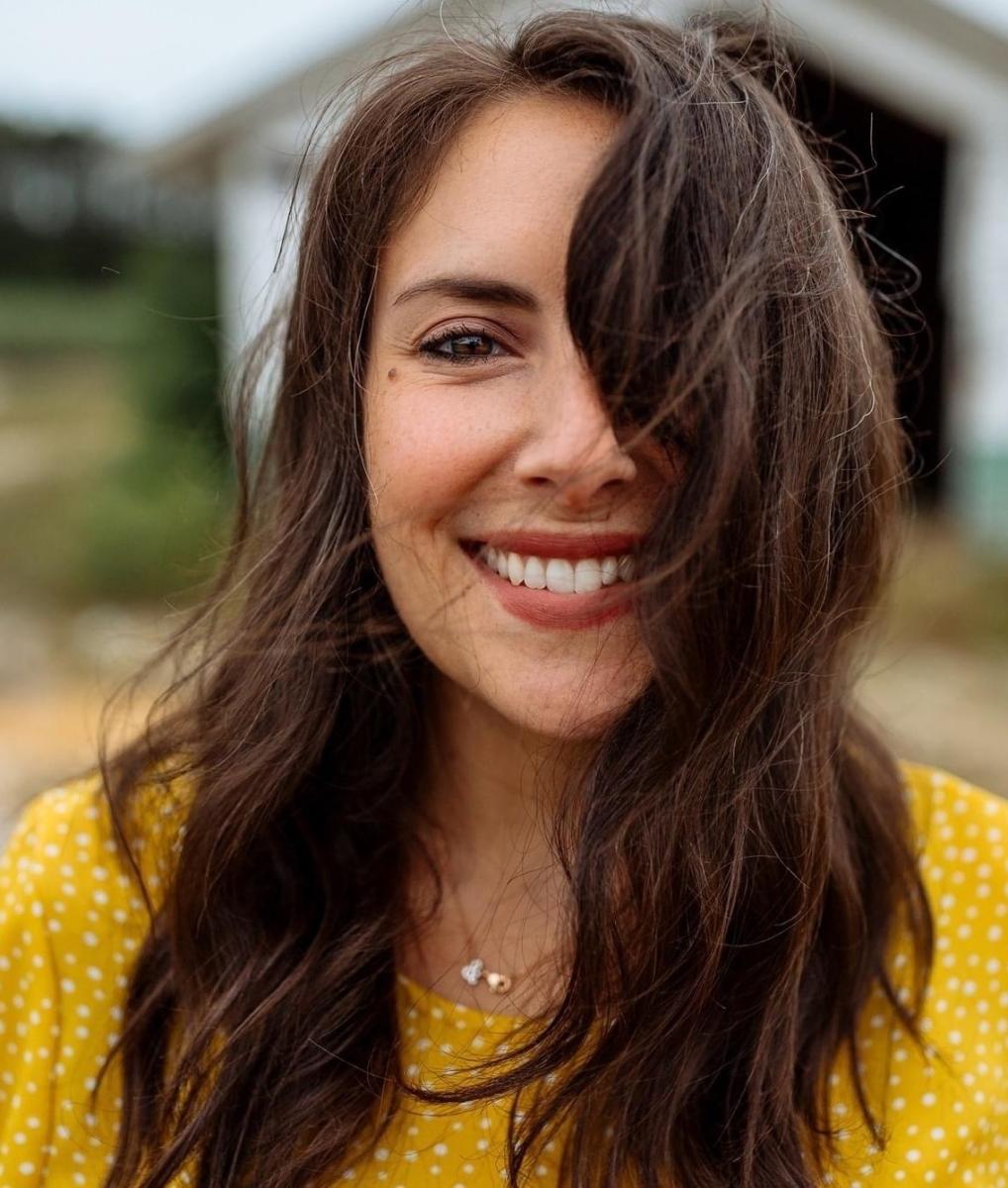
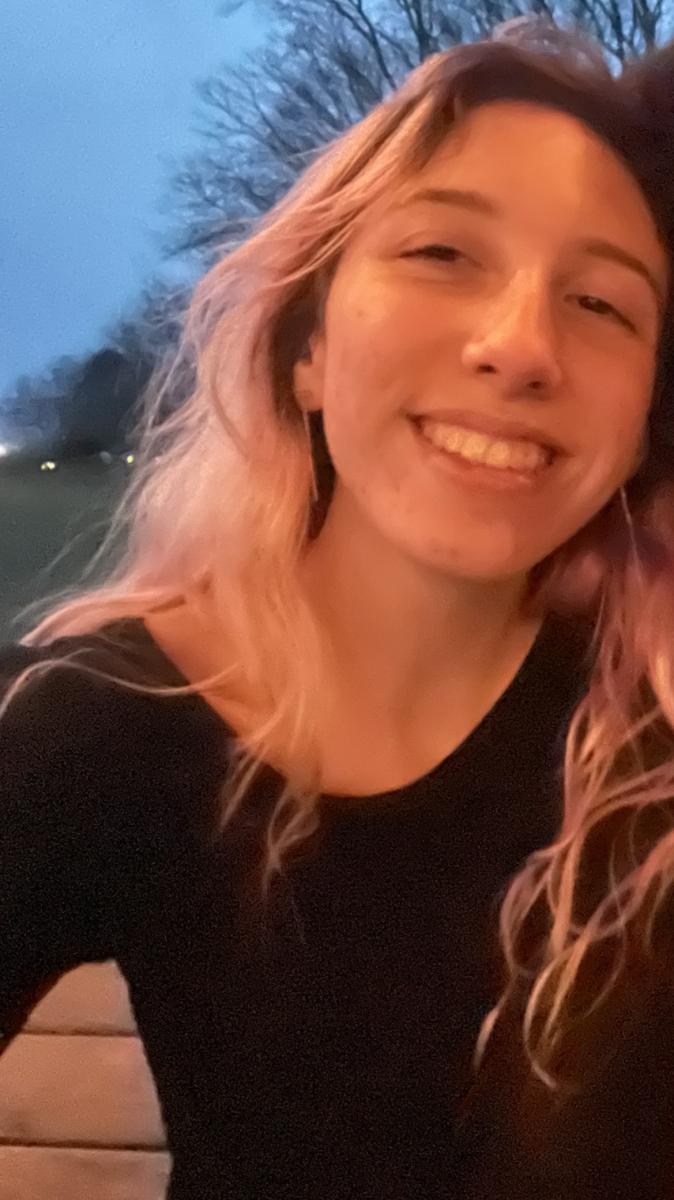
Stockton University’s Richard E. Bjork Library was established with the founding of the university during the 1971-1972 school year and has been a constant presence on campus for the past 50 years. During this time, the library has undergone many changes, but one thing that had become stagnant in more recent years is the library’s social media presence.
In 2021, graduate student worker Jessica Chamberlain started working at the library in Special Collections. Within the first few days of employment, Jess asked her supervisor, Special Collections Librarian Heather Perez, if the library had an Instagram account. To Jess’s surprise, she was told that the only social media presence for the library were outdated, seldom-used Twitter and Facebook accounts. Jess created an Instagram to highlight Special Collections activities and services. Around the same time, the library’s new Public Services Librarian, Joyce DeStasio, became the head of the library’s equally new Outreach Team. Coming from an advertising and marketing background, Joyce asked why Bjork Library itself didn’t have an Instagram account. After some discussion, they agreed that the existing account should be transitioned to one for the library in its entirety.
In the first meeting of the Outreach Team, Jess and student worker Sarah Hanlon pointed out the additional need for a TikTok account to round out the library’s social media presence. Being the only students on the team, Sarah and Jess took on the task of generating TikTok content. Although Sarah and Jess were frequent TikTok users, they did not identify as content creators by any means — but they pushed through the initial cringe of being on camera, and now proudly have many videos on the library’s TikTok, including one that has over 222,000 views!
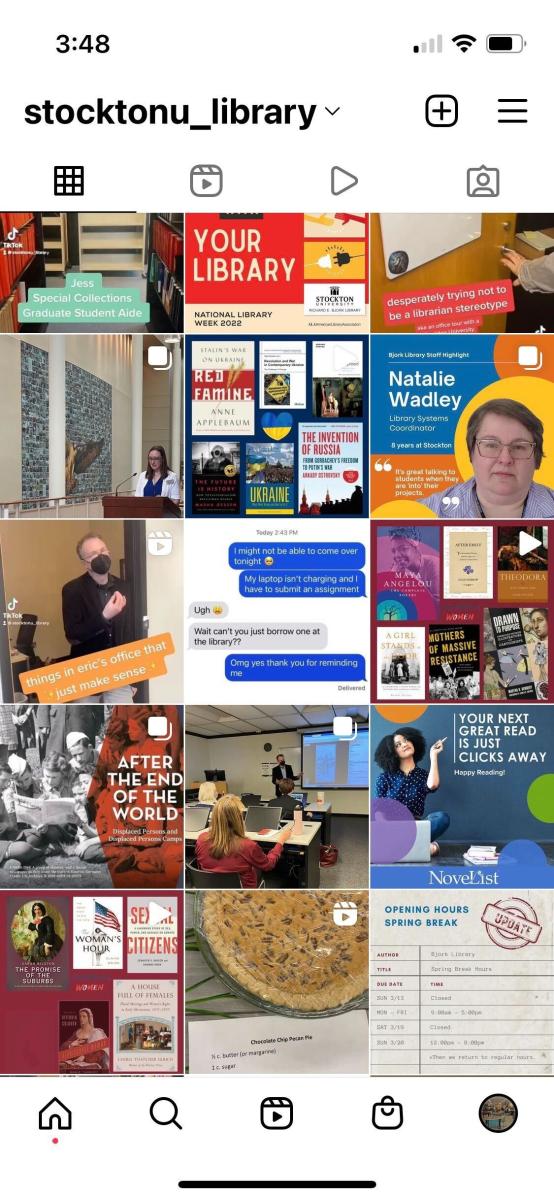
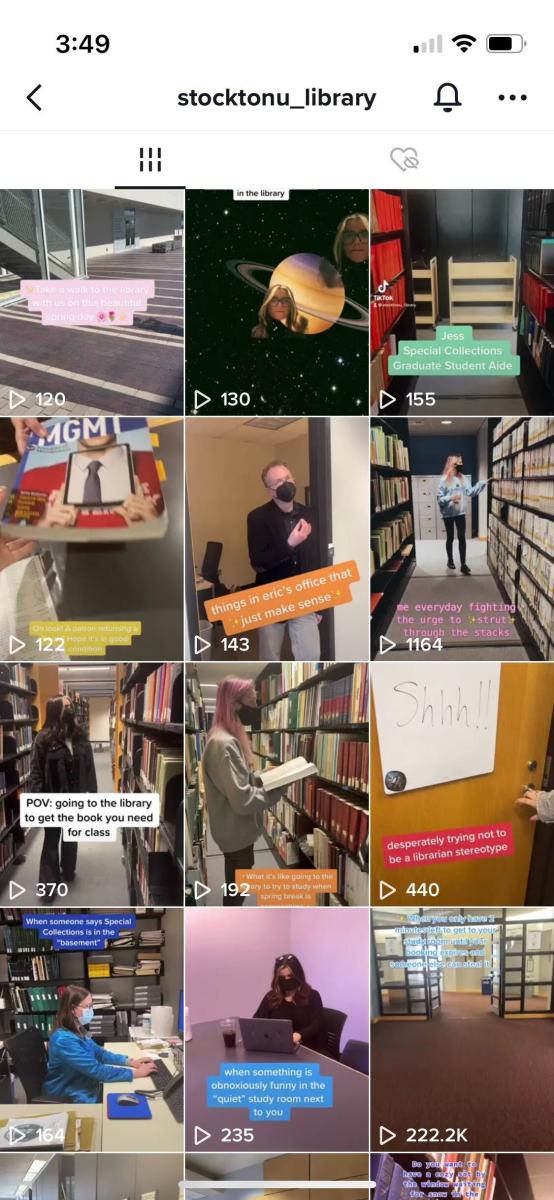
@stocktonu_library Instagram (left) and TikTok (right) grids
In one of her first tasks as team leader, Joyce organized a social media plan. This included posting frequency, audience, goals, and content ideas for each social media platform. The team considered deleting our Twitter and Facebook accounts, seeing as students mostly use TikTok and Instagram, but decided to keep them active for the time being. However, the team would focus on the two more popular platforms. The goal of the TikTok account is to be relatable to a Stockton student audience while simultaneously highlighting the library’s resources and spaces. On Instagram, the group would share photos of the library, graphics of updates and announcements, trends, library events, updates on our services, opening hours and closings, staff highlights — and re-shares of library TikTok videos, of course. As a low effort way to “keep the Facebook lights on,” Instagram posts were set to automatically share to Facebook. The Facebook and Twitter accounts would also be used for sharing press releases and articles related to the library’s scholarly publications or collections and exhibits.
Thanks to the library’s reinvigorated outreach efforts, the librarians and staff are becoming more intentional about connecting with students via social media and the library is continuing to grow across social media platforms. The outreach team’s intention behind the creation of the TikTok and Instagram was to meet the student body where they already are. By creating interesting content and interacting with Stockton’s students’ and organizations’ many social media accounts, Bjork Library hopes to continue generating student engagement on a variety of levels.
Follow us on TikTok and Instagram @stocktonu_library to stay on top of our latest content!
Jessica Chamberlain is a graduate student worker at Stockton University. She can be reached at Jessica.chamberlain@stockton.edu.
Joyce DeStasio is the Public Services Librarian at Stockton University. She can be reached at joyce.destasio@stockton.edu.
Sarah Hanlon is a student worker at Stockton University. She can be reached at hanlons@go.stockton.edu.
Editors
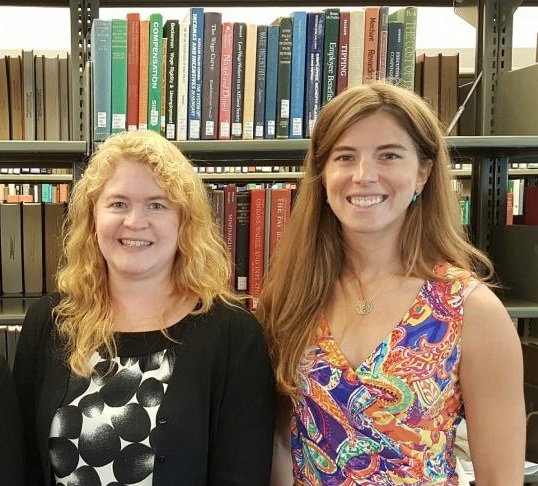 The CUS/ACRL-NJ Newsletter is edited by Joan Dalrymple, Reference and Instruction Librarian at Bergen Community College; Katie Maricic Cohen, Interlibrary Loan, Reference and Instruction Librarian at Ramapo College of New Jersey; and Liz Siecke, Reference and Instruction Librarian/Serials Coordinator at Ramapo College of New Jersey.
The CUS/ACRL-NJ Newsletter is edited by Joan Dalrymple, Reference and Instruction Librarian at Bergen Community College; Katie Maricic Cohen, Interlibrary Loan, Reference and Instruction Librarian at Ramapo College of New Jersey; and Liz Siecke, Reference and Instruction Librarian/Serials Coordinator at Ramapo College of New Jersey.
Editors Joan Dalrymple and Katie Cohen pose for a picture during the Summer 2015 Marketing and Communications Committee Meeting at Monmouth University Library.

